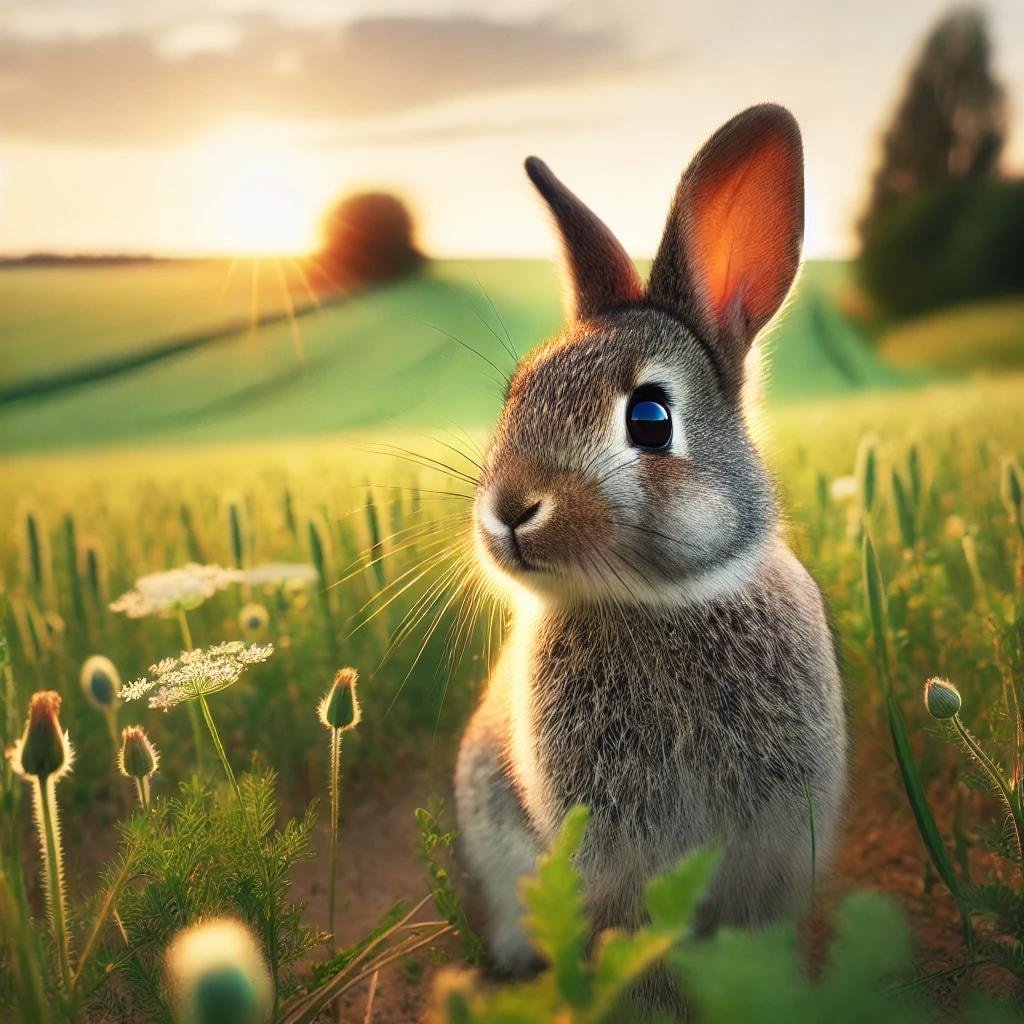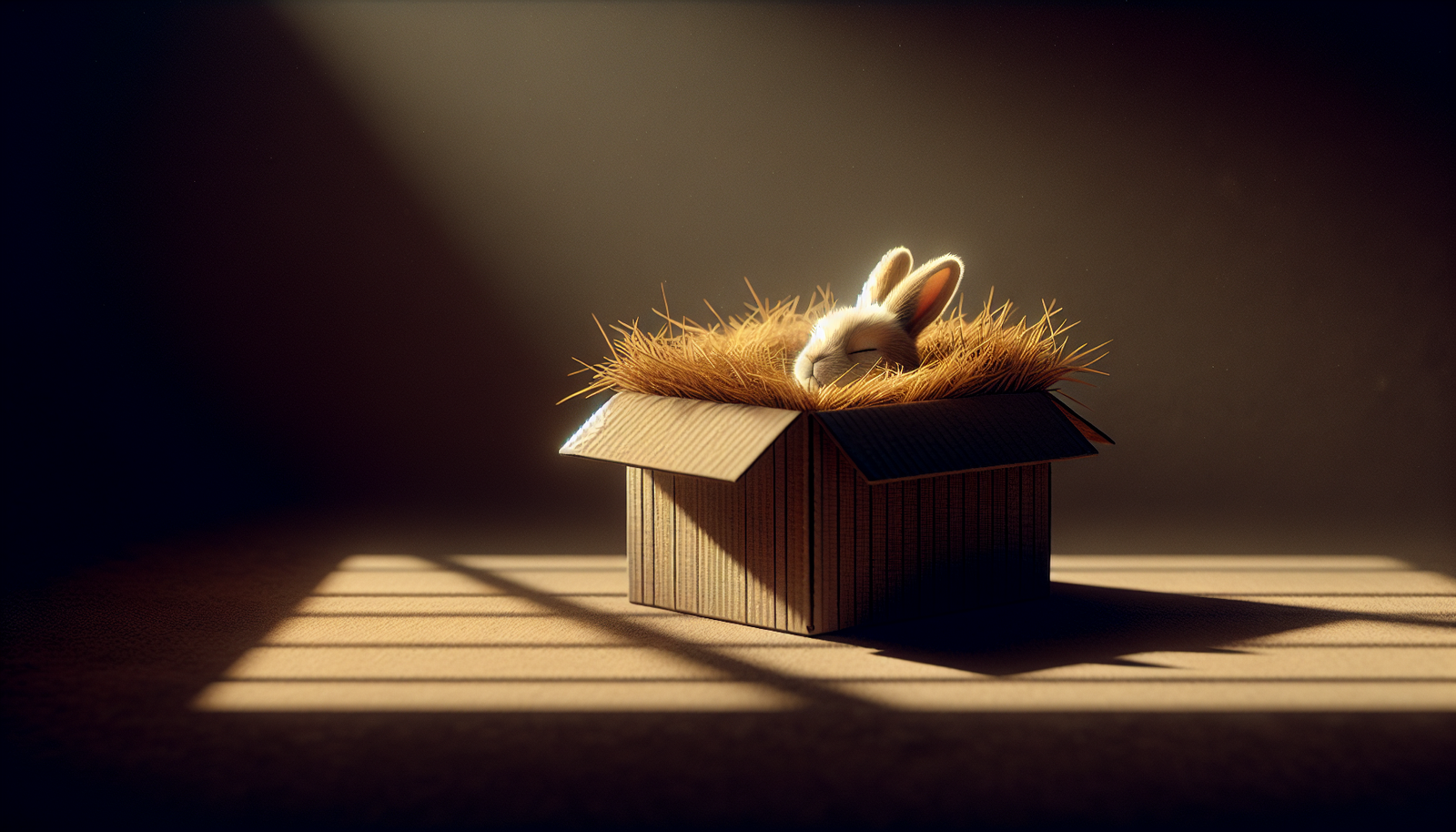Do bunnies like the dark? Find out how rabbits behave in low light and what you can do to keep them safe and comfortable at night.
Key Takeaways
- Rabbits have excellent night vision due to their large pupils and a special reflective layer in their eyes, which helps them see well in low-light conditions.
- Rabbits are not afraid of the dark, but sudden changes to complete darkness can startle them, causing temporary fright.
- Excessive light can stress rabbits, impacting their eating and pooping habits, and potentially causing eye damage. A balance of light and dark is crucial for their health and well-being.
Understanding Rabbit Vision

With eyes located on the sides of their heads, rabbits maintain vigilant surveillance of their surroundings, providing them a near 360-degree field of vision. This extensive visual range enables rabbits to stay constantly alert, monitoring for predators and allowing their other senses to heighten. But how do they fare when the lights go out? Although a rabbit’s world is not painted in the vibrant colors humans see, their rabbit’s eyes are a marvel in other ways.
Here are some interesting facts about rabbit eyes:
- With fewer cones in their eyes, rabbits are colorblind compared to humans
- Rabbits have a wider range of views than humans
- Rabbits have excellent night vision, thanks to their large pupils and tapetum lucidum, a reflective layer behind the retina that enhances their ability to see in low light conditions
Rabbits’ vision, though not as sharp as ours with an estimated acuity of around 20/240, is perfectly tailored to their crepuscular lifestyle. This means that during dawn and dusk when the light is dim, rabbits can see quite well. Their ability to navigate the twilight world is fascinating, as it differs so much from how we perceive the same environment. It’s a reminder of how diverse the animal kingdom is and how each species is uniquely equipped for survival.
Are Bunnies Afraid of the Dark?
Many pet owners frequently wonder if bunnies are afraid of the dark. Interestingly, rabbits are not generally scared of darkness; their eyes are adapted to dim lighting, which is a comforting fact for those who might worry about their pet rabbits at night. Yet, just like many animals, bunnies may find pitch black unsettling, with sudden transitions into darkness potentially causing them to become frightened and seek shelter. It’s not the darkness itself but the abrupt change that can be frightening.
Rabbits are crepuscular creatures, thriving in the low light of dawn and dusk. This means that they are naturally more active during these times and may even adjust their activity patterns to align with those of their human companions. Hence, don’t be surprised to see your pet rabbit energetically hopping around at dawn and dusk, or happily accompanying you during late-night Netflix marathons or early-morning activities.
How Rabbits Navigate in Low Light
As the lights dim, other senses take the lead in guiding rabbits. In the absence of light, a rabbit’s hearing and smell sharpen, becoming more sensitive to help them navigate their environment. Such heightened senses become crucial, tuning into the rustle of leaves or even the faintest footsteps of a potential predator like a cat. A rabbit’s sense of smell is particularly adept at detecting the presence of other animals, which might indicate a threat.
In the wild, their wild rabbit counterparts use these senses extensively to avoid predators like owls and to navigate through their underground warrens. Even domestic rabbits retain these instincts and abilities. It’s intriguing to imagine our pet rabbits, who spend their days lounging in hutches or hopping around living rooms, still possess the skills to maneuver through darker conditions like their ancestors, the wild rabbits.
Do Pet Rabbits Need a Night Light?
The necessity of a night light for pet rabbits remains a topic open for discussion. Generally, rabbits do not require artificial lighting at night, especially when they live indoors where residual light from the street or household appliances provides a low level of illumination. However, for rabbits that live outdoors or seem particularly agitated when alone in the dark, a distant, very dim light may help them feel safe without disrupting their natural cycle.
Constant light, on the other hand, can lead to disruption of their body clock, affecting sleep-wake patterns, digestion, and even hormone production. This is why, if a light is deemed necessary, it should mimic the soft glow of the moon rather than the bright blaze of daylight, using a dim lamp instead of a harsh overhead light.
Acknowledging the nocturnal tendencies of pet rabbits, which are among various nocturnal animals, and their requirement for a balanced light-dark cycle, including periods of complete darkness, is integral to their overall well-being.
The Role of Natural Light in Rabbit Health
Natural light is a major contributor to a rabbit’s health and contentment. Like many animals, rabbits rely on the cycle of daylight hours to regulate their natural behaviors, such as molting and reproductive activities. The changing length of days throughout the year signals to their bodies when it’s time to shed fur or prepare for mating. So, how many hours of light are required daily for optimal health? With longer summer days, around 8 hours of natural light is ideal.
Sunlight’s benefits for rabbits extend beyond mere behavioral cues. It naturally provides Vitamin D, which is vital for calcium absorption, leading to strong bones and healthy teeth. Without sufficient sunlight, rabbits can suffer from Vitamin D deficiency, leading to weak, brittle bones and dental issues that can severely impact their quality of life. Thus, ensuring that our furry friends get their dose of natural light is key to preventing these health problems.
Creating a Comfortable Sleeping Environment

Establishing a cozy, comfortable sleeping environment can markedly improve your bunny’s well-being. Rabbits have unique sleeping habits; they can sleep with their eyes open and may only be in a half-sleep state for the most part. During the day, it’s not uncommon to see them snoozing in a loaf position or stretched out on the floor, perhaps with their eyes open if they’re in a loaf position and more likely closed if they’re sprawled out.
To fulfill their sleep needs, pet owners should align with their rabbit’s inherent routines, offering a tranquil, dark space conducive to rest. Imagine the perfect rabbit bed: a cardboard box filled with hay, placed in a quiet corner of the room, offering a sanctuary where they can retreat to feel safe and sleep soundly. By understanding and accommodating their sleep behaviors, you’ll ensure that your bunny gets the rest they need to stay healthy and happy.
Signs Your Rabbit is Stressed by Too Much Light
Despite rabbits’ preference for low-light conditions, an excess of light can induce stress and anxiety. If you notice changes in your rabbit’s eating or pooping habits, it may be a sign that something is amiss, potentially due to excessive lighting. A constant barrage of light can make rabbits feel unsafe or on edge, disrupting their natural sense of security.
Overexposure to light isn’t just a source of stress; it can also cause physical harm. Rabbits living in constant light may suffer from eye damage and even weight gain due to the disruption of their natural rhythms. It’s vital to keep a close eye on their well-being, and adapting their environment if you notice signs of distress or discomfort. By ensuring a balance between light and dark, you’ll be providing your bunny with the best possible care.
Summary
As we’ve hopped through the nocturnal world of rabbits, we’ve uncovered the complexities of their vision, the importance of natural light, and how to create a comfortable environment that aligns with their instincts. Understanding these aspects of rabbit behavior not only satisfies our curiosity but also empowers us as pet owners to provide the best care for our furry companions. Embrace the twilight hours with your bunny, knowing that with the right balance of light and dark, you’re supporting their health and happiness.
Frequently Asked Questions
Can rabbits see in complete darkness?
No, rabbits cannot see in complete darkness, but they have excellent night vision that allows them to see well in low-light conditions. Therefore, they rely on their night vision to navigate in the dark.
Are rabbits active at night or during the day?
Rabbits are most active during the early morning and evening hours around dawn and dusk. They are crepuscular animals.
Should I leave a light on for my pet rabbit at night?
You don’t need to leave a light on for your pet rabbit at night, as they are adapted to low light conditions and do not require it for their sleep. Bright lights should be avoided to prevent disrupting their natural sleep-wake cycles.
How can I tell if my rabbit is stressed by too much light?
If your rabbit is stressed by too much light, you may notice changes in eating and pooping habits, signs of being on edge or unsafe, and potential eye damage or weight gain. It’s important to monitor these signs closely and make adjustments to their lighting as needed.
Do rabbits need sunlight for their health?
Yes, rabbits need sunlight to absorb Vitamin D, which is essential for their calcium absorption and overall bone health.



